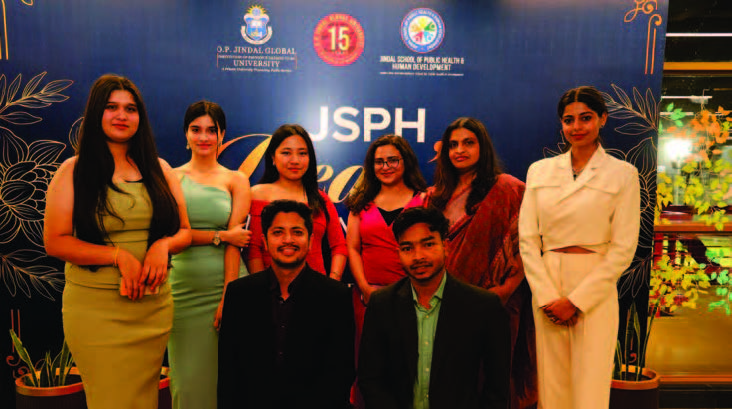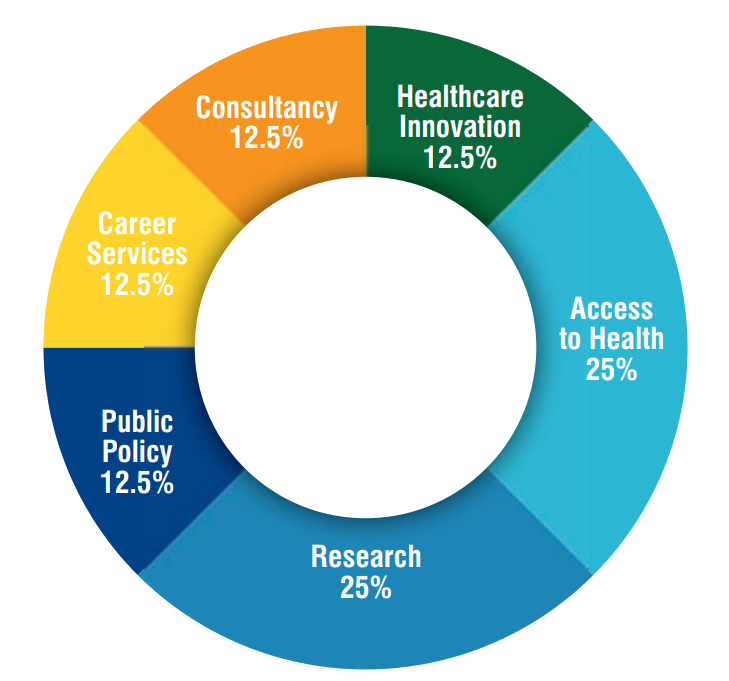The Master of Public Health (MPH) is one-year residential programme combining core courses, electives and an internship, and either a dissertation, a capstone project or a community service learning project. Our curriculum adheres to the competency frame of CEPH and is guided by the human development approach. Core courses provide foundational knowledge about population health and training in the qualitative and quantitative methods of public health. The electives allow students to explore innovations, develop specializations, and identify inter‑sectoral linkages. The programme employs diverse teaching methods, including classroom lectures, simulations, guided intervision, problem‑based learning (PBL), media and film analysis, community service learning (CSL), and field excursions.
One Year MPH degree programme is divided into four terms
| Term | Subject |
|---|---|
|
1st |
|
|
2nd |
|
|
3rd |
|
|
4th |
Dissertation/Capstone/CSL project. |
The eligibility criteria for the Master of Public Health (MPH) programme require applicants to hold a Bachelor’s degree from any recognized university, regardless of their undergraduate major. Final-year students are also eligible to apply, but admission will be subject to the successful completion of their Bachelor’s degree.
Important Advisory for Students and Parents
O.P. Jindal Global University (JGU) does not appoint or authorise any agent, intermediary, or consultant for admissions to any the undergraduate, postgraduate and doctoral programmes offered by JGU.
If any individual or organisation approaches you demanding money, donations, or favours for admission, please immediately report the matter to the police and to the Registrar of the O.P.Jindal Global University at registraroffice@jgu.edu.in
All admissions to JGU’s academic programmes are conducted strictly on merit. JGU has no management quota, no donation/capitation seats, no NRI/Foreign National quota, and no special quota of any kind.
Paying or offering any form of donation or capitation fee for admission to JGU is illegal, and individuals involved in such activities are liable for criminal prosecution.
For all official information and admission-related queries, please contact the Admissions Office directly and apply only through the University’s official website: www.jgu.edu.in
Tuition Fees: 3,50,000 (INR)
| Particulars | Amount in (Rs.) |
| Residential Charges per Year* | N/A |
| Other Allied Service Charges (Other Allied Services, including but not limited to food, Laundry, Security Services, Housekeeping charges, electricity etc., per annum* |
N/A |
| Refundable Security Deposit** (One time payment) | 50,000 |
*The Tuition fee, residential charges and other allied service charges are subject to an annual increase of ten percent (10%).
**The security deposit will be fully refunded, subject to the completion of studies and/or receipt of a ‘No Dues Certificate’. The security deposit shall not carry any interest.
*The security deposit will be fully refunded, subject to the completion of studies and/or receipt of a ‘No Dues Certificate’. The security deposit shall not carry any interest.
Our first cohort of Master of Public Health (MPH) graduates is already making an impact in the field, actively contributing to improvements in the public health landscape across the country. All 8 students are employed, 7 of them secured positions in the formal sector across diverse areas of public health and human development while remaining one is contributing the field through consultancy.


Electives are broadly organized under six specializations |
|
|
Human Rights and Human Development |
|
|
Environment Health |
|
|
Health Systems & Policy |
|
|
Mental Health |
|
|
Gender, Health Gender, Sexuality & Health |
|
|
Humanitarian Relief & International Security |
|
O.P. Jindal Global University awards upto 50% Merit‑cum‑Means Scholarships (MCM) eligible candidate.
Continuance of this scholarship to the next semester is based on Academic Performance, Discipline, Minimum 75% Attendance.
Participation in academic and non‑academic events.
Advanced Research and Professional Development is a culmination of the coursework and electives/specializations chosen by the students. As part of research and professional development training, students have the following credited options.
| Credited Internship | Field Immersion to understand Healthcare in Rural Settings |
| Options of Dissertation/Capstone/Community Service Learning Project | Study Abroad/Semester Exchange |
|
Research internship opportunity with the following in-house research centres |
|
|
Centre for Implementation Research The Centre for Implementation Research (CIR) at Jindal School of Public Health and Human Development serves as a central hub for addressing active research and bridging the gap in knowledge transfer. Its main goal is to support the effective application of evidence‑based research findings across various disciplines. By thoroughly examining the factors that influence the uptake and consistency of these treatments, CIR provides essential information and support to academics, practitioners, and policymakers. |
Centre for Humanitarian Studies The Centre for Humanitarian Studies (CHS) is an interdisciplinary hub committed to advancing knowledge in humanitarian health through evidence‑based and participatory approaches, particularly in conflict research and humanitarian action. CHS aims to generate essential insights into the origins and development of past and ongoing humanitarian crises, focusing on effective health responses informed by policy research, training, and practical application. |